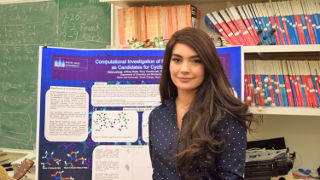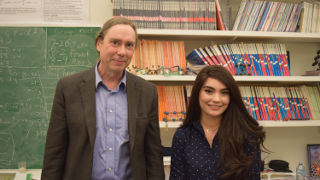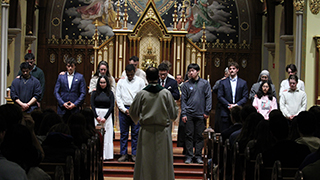Biochemistry Major Selected for Internship at Los Alamos - Seton Hall University
Wednesday, March 21, 2018

Sara Lamcaj with her award-winning presentation on Proline.
Sara Lamcaj, a senior biochemistry major in the College of Arts and Sciences, has been chosen for a post-baccalaureate internship at Los Alamos National Laboratory in New Mexico this summer.
Lamcaj was selected for the honor by scientist Amanda Barry of the Los Alamos National Laboratory. Barry is one of the Energy Department's leading molecular biologists in the field of algal biofuels and is the past manager of the photobioreactor matrix at Los Alamos. In addition to her expertise in the fields of molecular biology and biochemistry, Barry is a noted expert in the manipulation of microalgae and metal metabolism. Lamcaj will be working directly with Barry, assisting in the investigation of algae as a viable alternative to traditional petroleum-based fuels. Lamcaj was the only intern chosen from the Department of Energy's Science Undergraduate Laboratory Internship program.
Made famous as the highly classified center of scientific research in the United States dating back to the 1940s, internships at Los Alamos are highly sought after and extremely competitive. As a post-baccalaureate intern, Lamcaj could extend her internship past the summer and become a fellow in the laboratory for up to two years as she explores options for her next step, whether it be graduate school, a research career or a combination of the two.
Originally from Albania, Lamcaj's love for science began when she was very young. After attending Bergen Community College for two years, where she led peer assisted study sessions in chemistry, biology and philosophy, Lamcaj transferred to Seton Hall as a junior.
"Seton Hall University is a renowned research school, but when I came here I wasn't sure what area of research I wanted to pursue," said Lamcaj. "There was an overwhelming amount of research happening in every scientific field and I didn't know where to begin. I am thankful I was introduced to computational chemistry research by Professor Stephen Kelty – it is an excellent fit for my strengths and interests."
It took Lamcaj less than a month after arriving on campus to find that next challenge: working on a theoretical computational research project with Stephen Kelty, professor of chemistry. Kelty recruited a team of students to work with a modified form of Proline, an amino acid commonly found in proteins. The unique chemical structure of Proline offers great promise in the preparation of novel protein-based therapeutic drugs for the treatment of a variety maladies, including Alzheimer's disease. Computational modeling greatly enhances the development of these new materials since it can be used to predict the chemical and physical properties thus avoiding unproductive experimental effort.
Lamcaj is the only undergraduate member of the research team; the other two team members, Jeffrey Raab and Rory Vander Valk, are both Ph.D. candidates in chemistry.

Stephen Kelty and Sara have been working together for a year and a half on research of the amino acid Proline.
"Working with Sara as a team member on this project has been a great pleasure," said Kelty. "As the project combines elements of chemistry, physics and computational science, it requires a group of researchers whose individual expertise complements one another well. Sara fit perfectly into this research environment."
Lamcaj presented the team's research at the Independent College Fund of New Jersey's Annual Symposium on March 5, 2018 at the Liberty Science Center. She was one of only five people to win an award out of more than fifty presenters. Lamcaj has also won the Novartis Science Scholarship from the Novartis Pharmaceuticals Corporation in 2016 and 2017. These scholarships have assisted in funding Lamcaj and the team's proprietary research on Proline.
Lamcaj attributes much of her success over the last two years at Seton Hall to a combination of the small class sizes and the "approachability" of faculty.
"The small class size was the main reason I decided to come to Seton Hall," said Lamcaj. "The labs are pristine, and the professors are friendly but over everything else, I was impressed by the promise of an intimate class setting where I could ask questions as needed. That is not something I would have gotten at a larger research university."
Next stop, Los Alamos.






